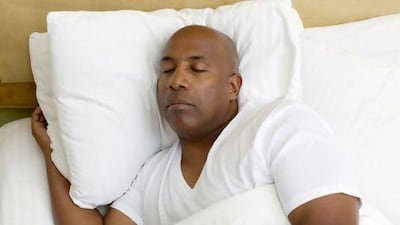Most of us are familiar with the idea that different foods adversely affect our sleep. Some of us, like Fatima Neaimi, 53, from Abu Dhabi, avoid eating cheese and chocolate late at night; others, like Jenny Read, 52, from Khalifa City, avoid meat. "It makes me restless all night, with wild dreams," she says.
So far, so uncontroversial: as Dr Khaldoun Mozahem, a neurologist and specialist in sleep medicine at the American Center for Psychiatry and Neurology in Abu Dhabi, says: "In some patients, consuming heavy or fatty meals may lead to insomnia that night."
Up until now, the effect of particular foods on sleep patterns has been thought to be temporary. "It wouldn't affect the sleep pattern in the sense of duration of sleep in the long run," says Dr Mozahem.
Now, however, a study from the Perelman School of Medicine at the University of Pennsylvania shows for the first time an association between certain nutrients and different sleep patterns. The research, published in the journal Appetite, suggests that people who eat a wide variety of foods have the healthiest sleep patterns.
The research team analysed data from the 2007-09 National Health and Nutrition Examination Survey. One of the questions in the survey was how many hours of sleep each participant had every night. The researchers divided the responses into "very short" (less than five hours per night), "short" (five to six hours), "standard" (seven to eight hours) and "long" (nine hours or more).
They then looked at a detailed breakdown of each participant's diet. The results were adjusted to account for demographics, socioeconomics, physical activity and other factors.
The team found a number of dietary differences between the groups - largely driven by a few key nutrients. Very short sleep, for example, was associated with a lower intake of tap water, lycopene (which is found in red and orange-coloured foods) and total carbohydrates. Short sleep was associated with lower levels of vitamin C, tap water and selenium but with higher levels of lutein (found in green, leafy vegetables). Long sleep was associated with a lower intake of theobromine (found in tea and chocolate), a saturated fat called dodecanoic acid, choline (found in eggs and fatty meats) and carbohydrates, but with a higher intake of alcohol.
Overall, people who slept the standard seven to eight hours per night enjoyed the greatest variety in their diet, whereas those sleeping for a short or very short time ate the least varied diet.
Michael A Grandner, an instructor of Psychiatry and member of the Center for Sleep and Circadian Neurobiology at the University of Pennsylvania and one of the authors of the report, emphasises that no conclusions can yet be drawn about how to optimise sleep with diet and notes that some of the results, such as the link between lower intake of tap water and very short sleep, requires more research to make sense.
"Future studies will need to untangle this relationship," he says. "We do know that excessive water at night disturbs sleep [because of increased trips to the bathroom], but in terms of normal levels of water consumption, we are still looking into why this might be the case."
Similarly, the researchers cannot yet explain the connection between carbohydrate intake and sleep duration.
"We need to study this further to have a better answer," he says.
According to Lama Al Khuja, a clinical dietitian at Health Bay Polyclinic and an adjunct faculty in the Department of Public Health and Nutrition at Zayed University, there may be two reasons for the relationship between a varied diet and healthy sleep patterns.
The first is a nutritional one: "The variety of diet provides an array of macronutrients, vitamins and minerals which regulate sleep promoters such as tryptophan, serotonin and melatonin," she says. "Further, carbohydrates, proteins and fat stimulate hormones from the digestive tract, which have a role in the sleep-wake cycle and sleep patterns."
The second is more of a lifestyle issue. "People who sleep seven to eight hours a day tend to have organized meal patterns, thus accounting for a better food variety… Further, people leading a stressful life tend to have a higher consumption of caffeinated beverages, such as tea and coffee, and alcohol, which act as stimulants or replace other healthier food choices."
Whatever the precise reasons for the study's results, Grandner stresses the importance of a healthy diet. "It seems pretty clear that healthy sleep is part of an overall healthy lifestyle and that a healthy diet likely supports healthy sleep. More than anything, the study highlights the relationship between healthy sleep and healthy diet as two pillars of a healthy lifestyle [which also would include physical activity]. As a culture, we still do not make sleep a priority, but sleep is an important ingredient of overall health."
How to achieve a varied diet, with clinical dietitian, Lama Al Khuja:
A varied diet should include all food groups of carbohydrates, proteins, fat, legumes, colourful fruits and vegetables and dairy products in balance and within the recommended caloric requirements. The more you add colour to your plate, the greater the variety of nutrient you will get.
A first step to a varied dietary intake is to establish an organized meal pattern - no skipping of main meals.
- The addition of colourful fruits and vegetables to your meals will provide you with the needed vitamins and minerals, which play a major role in promoting better sleep patterns.
- Gradually shift your carbohydrates into whole grains and add proteins to your plate.
- Include dairy options such as milk or yoghurt if your diet lacks it.
- Cut down on sugar, caffeinated beverages and alcohol intake as they are stimulants and provide empty calories that replace essential nutrients.

